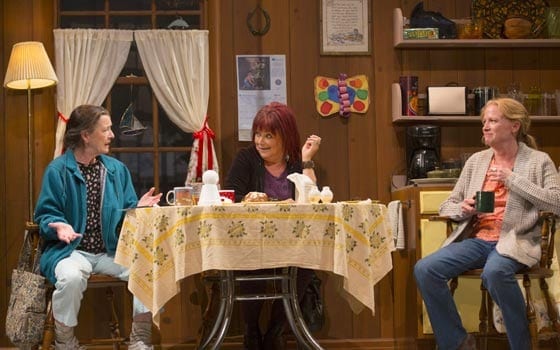
Nancy E. Carroll, Karen McDonald and Johanna Day in the Huntington Theatre Company’s production of David Lindsay-Abaire’s “Good People.” (T. Charles Erickson photo)
In the wake of the Democratic and Republican conventions as well as the now infamous “47 percent” video in which Mitt Romney tells wealthy donors that almost half the nation is on the dole, it is tempting to think that Pulitzer Prize-winning playwright and South Boston native David Lindsay-Abaire revised his play “Good People” to catch the buzz words of the day.
But no. The smart, fast-moving and funny production of “Good People” at the Huntington Theatre Company through Oct. 14 presents the same play that premiered in February 2011 at the Manhattan Theatre Club and won the year’s New York Drama Critics’ Circle Award for best play.
Directed by Kate Whoriskey with an excellent five-member cast and fabulous sets by Alexander Dodge, the play nails the luck-versus-pluck polarities in the current political debate.
On one hand, Margie, the central character, luminously performed by Johanna Day, is resigned to bad breaks. At the other extreme is her high school boyfriend Mike (a persuasive Michael Laurence), a child of the projects who has become a reproductive endocrinologist. He returns to Southie only to give a talk at the Boys and Girls Club and regards his success as the reward of his determination.
Between these two extremes is Stevie, played with low-key dignity by Nick Westrate, who is Margie’s neighbor and her boss at the Dollar Store.
The opening scene reveals a great deal about Stevie and Margie. Stevie summons Margie for another of what she ruefully calls their “alley conferences.” Surrounding them are warehouse walls and a dumpster, a setting that suggests they are both commodities. Margie taunts Stevie about not having an office and inflicts a volley of manipulative, teasing comments and excuses before yielding to her fate.
Unwilling to lose his job for continuing to tolerate Margie’s constant tardiness, Stevie fires her. He offers to contact his brother at nearby Gillette to help her find a job. She refuses his offer.
So rich is Lindsay-Abaire’s writing that while his characters evoke dilemmas larger than their own, they are never less than complex human beings.
A fighter accustomed to losing, Margie is both kind and kind of mean, honest but ready to tell half-truths. She is franker with her friends. Two irresistible actresses play these long-time neighborhood chums. Nancy E. Carroll is Dottie, Margie’s amusingly self-absorbed landlady who makes toys out of Styrofoam cups. Wearing a tacky red wig, Karen MacDonald plays Jean, Margie’s sassy and loyal pal.
Sitting around Margie’s kitchen table, the three trade old tales and gossip while Margie’s developmentally disabled adult daughter, Joanie, watches TV in the next room.
Tantalized by Jean’s news that Mike just visited his old neighborhood, Margie decides to look him up, hoping he’ll give her a job.
Scenes shift between Southie settings — Margie’s kitchen and a church basement bingo game, where the three women sit in a row like a panel of judges and the priest’s voice calls the numbers like an unseen deity — and Mike’s quarters: a blond wood office decorated with leather-bound books and hand-blown glass vases, and his palatial Chestnut Hill living room.
As Margie and Mike encounter one another, the question of who dumped who is just the tip of the iceberg as they trade their different takes on reality. Joining the fray is Kate, played by Rachael Holmes, who ably conveys this young woman’s fraught life of privilege.
Amid the ambiguity, one character emerges as a figure of true decency, Stevie. He shows that no matter what hand they’re dealt, people can help each other make things better.






